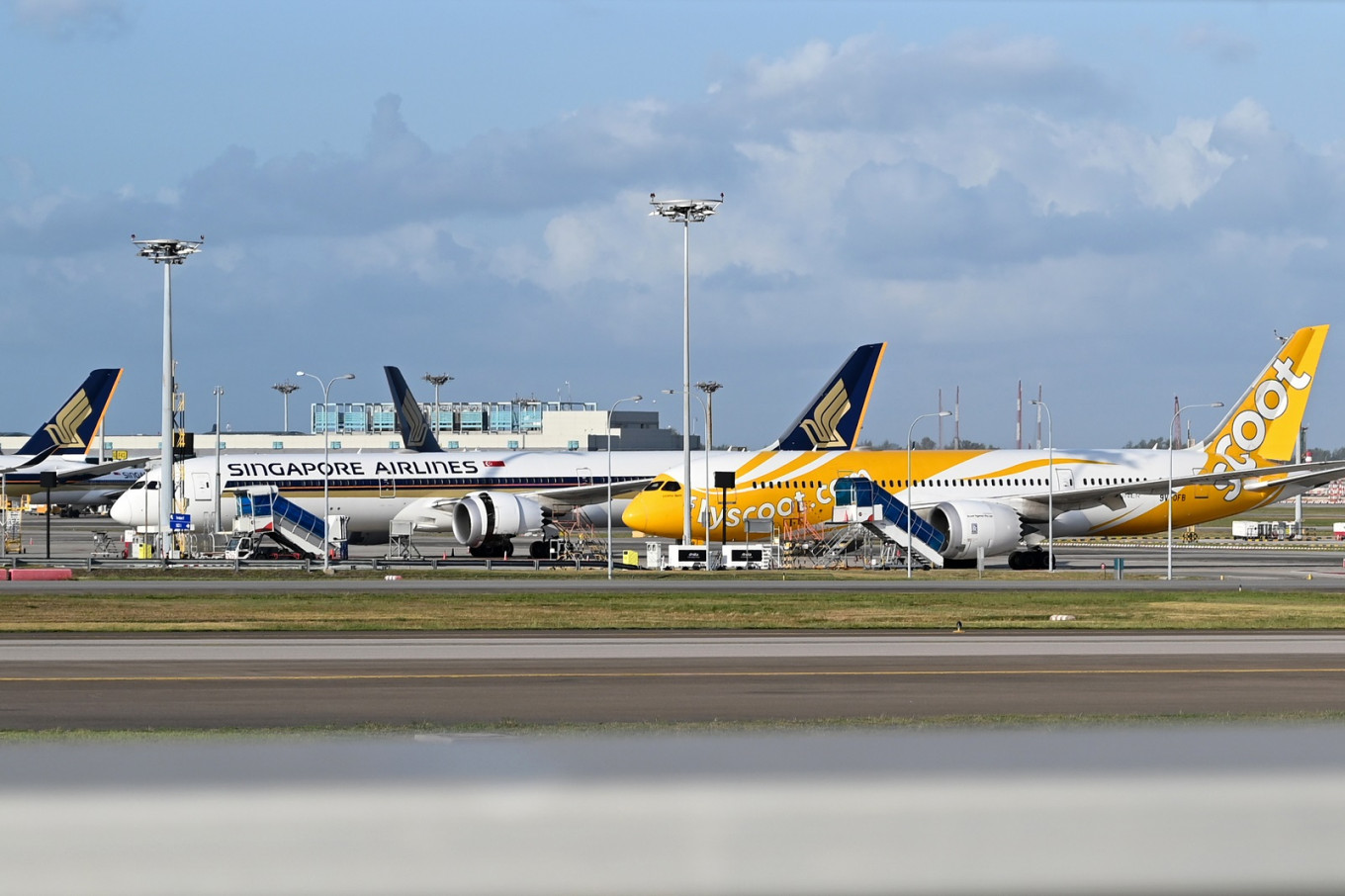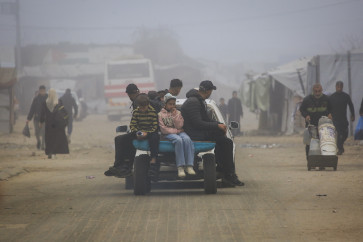Popular Reads
Top Results
Can't find what you're looking for?
View all search resultsPopular Reads
Top Results
Can't find what you're looking for?
View all search resultsPlanes grounded by COVID-19 kept in tip-top shape at Changi
The coronavirus pandemic has grounded airplanes and emptied offices all around the world for months. But these idle assets need to be kept in top condition and ready to run when economies reopen.
Change text size
Gift Premium Articles
to Anyone
S
ome taxiways at Changi Airport have now been converted into parking spaces for planes, with 143 aircraft from the four local airlines grounded there as the Covid-19 pandemic drags on.
The airlines are Singapore Airlines (SIA), SilkAir, Scoot and Jetstar Asia.
As more work is needed to maintain a parked aircraft than a flying one, about 800 maintenance workers have stepped up work around the clock to ensure that the planes can take to the skies quickly when air travel picks up again.
Mr Tan Kah Han, senior director of the Civil Aviation Authority of Singapore (CAAS) safety regulation group, told The Straits Times: "A lot more effort is needed to maintain an aircraft on the ground, as compared with an aircraft that is flying."
The engine of the plane has to be started from time to time, while the cockpit and the wheels have to be protected from sunlight.
Among many other measures are towing the aircraft to cycle the landing gears' shock absorber and to lubricate the seals on it.
The frequency of such measures depends on the plane model.
A team of 27 CAAS airworthiness inspectors is in charge of ensuring that the planes are maintained at the required standards.
Beyond this, the authority, Changi Airport Group (CAG) and airlines also work together to regularly maintain some 60 planes that are still flying.
"There are almost 200 aircraft - that's quite a lot," said Mr Tan.
"Because of the demand of manpower required... some planes have been moved to Alice Springs," he added, referring to 17 planes from Singapore Airlines Group that are parked at the Asia Pacific Aircraft Storage facility in the Australian town.
He noted that demand for air travel has dropped so much that nowadays, one passenger flight takes off for every five cargo flights, a reversal of the ratio before the COVID-19 pandemic.
In the period between May 13 and next Tuesday, there are around 700 to 800 cargo flights, including passenger planes carrying only cargo, scheduled to fly in and out of Changi Airport.
During the same period, there are around 160 passenger services scheduled to operate.
CAG told The Straits Times that it has about 180 aircraft parking spaces.
But with about 200 planes - including those that are still flying - requiring spaces, it has had to use taxiways to accommodate all of them.
CAG said: "Planes categorized as active are used more frequently for flights and will be parked at contact aircraft stands and remote aircraft stands for easier access.
"Planes categorized as parking are not flying in this period and are assigned to park at taxiways and remote aircraft stands that are further away."
Mr Yeo Kia Thye, CAG's managing director for airport operations planning and airside, said: "As the COVID-19 situation evolves, Changi Airport's essential workers will continue to adapt to the new challenges to keep the airport open and operational at all times."
SIA Engineering Company said that its engineers and technicians form teams of seven to 10 to maintain the parked planes at Changi Airport.
"These include the washing of external surfaces if contaminants are found, lubrication of flight control services and landing gear, checking and maintaining tyre pressure," it added.
The teams are now working staggered hours, observing separate meal times and taking their temperatures regularly to guard against the coronavirus.
SIA, SilkAir, Scoot and Jetstar Asia all said the thorough maintenance of their fleets will enable them to ramp up services quickly and safely when demand picks up.
CAAS' Mr Tan, citing the example of more cars breaking down last month due to the vehicles not being used during the circuit breaker period, said: "With a car, you can stop on the road and call a tow truck service, but you can't do that with an aircraft."
Read also: Singapore to allow travelers to transit through airport from June 2
Simulators keep air traffic controllers sharp
Air traffic control officers in Singapore, a team of about 400, are undergoing more training on simulators.
They have to, if they are to keep themselves sharp amid a plunge in flights at Changi Airport.
The 20 per cent reduction in manpower needed to man the airport's control tower has also allowed the Civil Aviation Authority of Singapore (CAAS) to form a reserve team in case any officer is infected with COVID-19.
Mr Tan Kah Han, senior director of the safety regulation group at CAAS, said the officers are trained to handle high traffic volume and complex operations.
"As COVID-19 has resulted in significant reduction in traffic, CAAS has included supplementary simulator sessions to allow them to continue practising and honing their skills in scenarios of high traffic volume and complexity," he said.
"This serves to keep them prepared and ready as and when traffic volume returns."
Pilots in Singapore are increasingly using flight simulators as well, to get the required practice as flights have dwindled to a "very low" number, he added.
"If there is an emergency, we need them to be at the top of their game, so they will go to simulators to hone their proficiency and overall situational awareness."
Mr Tan gave the hypothetical example of a pilot who has carried out only one landing with a plane when he needs three to meet proficiency standards. This pilot will now be able to make up for the shortfall in flights by going through simulator sessions.
In the meantime, Mr Tan said, medical examinations for pilots, licensed engineers and air traffic controllers are still taking place.
Singapore Airlines said its pilots will continue to have regular training programs to maintain their licence qualifications.
Its cabin crew members are also participating in virtual learning classes conducted by external training providers to refresh their current knowledge or acquire new skills in areas relevant to their work.
"For now, all we can do is to make sure that our system is safe and whatever (the staff) apply now is continuously at a top level," said Mr Tan.
This article appeared on The Straits Times newspaper website, which is a member of Asia News Network and a media partner of The Jakarta Post







